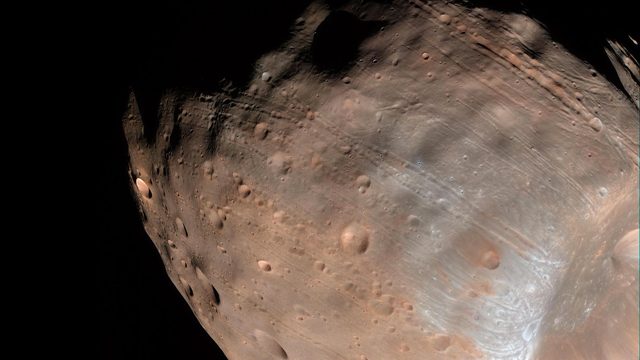SUMMARY
This is AI generated summarization, which may have errors. For context, always refer to the full article.

PARIS, France – France and Japan want to recover pieces of a Martian Moon and bring them back to Earth, the head of France’s National Centre for Space Studies (CNES) said Thursday, April 13.
The Martian Moons Exploration project would launch a probe in 2024 destined for Phobos, the largest and closest of two moons circling the Red Planet.
Paris and Tokyo signed a preliminary agreement on Monday, April 10, and will make a final decision before the end of the year, CNES president Jean-Yves Le Gall told Agence France-Presse.
“It’s a very important mission because – besides the Moon – it would be the first time samples from the satellite of a planet would be brought back to Earth,” he said by phone.
Slightly egg-shaped, Phobos is 27 kilometers (17 miles) in diameter from end-to-end.
Analyzing its composition would solve a long-standing question as to its origins.
One theory holds that the oblong moon is an asteroid captured by the gravitational pull of Mars. Another says that it is left-over matter from the Red Planet’s creation event.
Landing on Phobos will also provide another vantage point for observing Mars, only 6,000 kilometers (3,700 miles) distant.
Getting there poses fewer challenges that landing on Mars, a graveyard for several failed missions. (READ: Russia plans return to Mars, Moon despite money woes)
“It should be twice as easy because the probe will not have to go through the Martian atmosphere,” Le Gall said. (READ: SpaceX releases travel posters to Mars)
The Japanese partner for the project is the Japan Aerospace Exploration Agency.
Phobos – closer to its planet than any other moon in the solar system – is approaching Mars by about 2 meters (6.5 feet) every century. Scientists expect the moon to be pulled apart in 30 to 50 million years.
In 2011, a Phobos-bound probe launched by Russia – it’s first interplanetary mission in 15 years – failed, with pieces falling into the Pacific two months later.
In 2020, the joint Europe-Russia ExoMars mission will lauch a rover tasked with finding traces of Martian life, past or present.
NASA’s Curiosity rover has been criss-crossing the planet for more than three years.
The American agency has plans for a manned trip in the next 10-15 years, with a similar project also being pursued by US billionaire Elon Musk.– Rappler.com
Add a comment
How does this make you feel?
There are no comments yet. Add your comment to start the conversation.